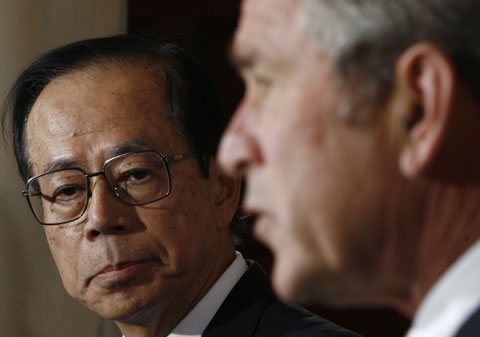US-Japan ties cemented amid worries
Updated: 2007-11-17 18:51
WASHINGTON -- US President George W. Bush's first official meeting with Japan's new prime minister Yasuo Fukuda at the White House on Friday fortified US-Japan strategic partnership, although the latter may not be fully satisfied with the US commitment during the visit.
 |
"This is an important visit...It's recognition that our alliance is vital for peace and security," Bush said at a news briefing after talks with the Japanese prime minister.
"One of the things we've decided to do is to continue to make sure the US-Japanese relationship is the cornerstone of security and peace," he said.
Japan has been a key US ally in East Asia since American military occupation of the country at the end of World War II in 1945. The 26-hour visit to Washington by Fukuda, who took premiership in September, has again demonstrated the unique relationship between the two countries.
Describing the United States as "one and only ally for Japan", the 71-year-old Japanese political veteran said "we agree that Japan-US alliance is playing an indispensable role in enabling Japan and the United States to address global issues together and also provides the basis for our active diplomacy in Asia."
Analysts believe that except for their discussions on hot issues in Asia, Bush and Fukuda had been looking for mutual assurances over the settlement of thorny issues in bilateral relations.
The Bush administration wants commitments from Fukuda that he will push for the renewal of an expired law allowing Japan's navy to fuel warships supporting US-led forces in Afghanistan.
As for Fukuda, it will be an ideal outcome if he wins the pledge from Bush that the US will not remove the Democratic People's Republic of Korea (DPRK) from a blacklist of countries supporting terrorism until Pyongyang accounts for the kidnappings of Japanese citizens in the 1970s and 1980s.
In the summit, Bush did have what he wanted from the Japanese prime minister. "I told President Bush that I will make the utmost efforts for an early enactment of a legislation so that Japan's naval refueling mission in the Indian Ocean will resume as soon as possible," Fukuda said.
However, Bush seems to have made a kind of discounted statement while he was talking about Japan's concern. Although he claimed that he understood how important the abduction issue is to the Japanese people, he told Fukuda no more than that "we will not forget the Japanese abductees, nor their families."
Some politicians and analysts in the US are worrying that if the US turns a deaf ear to Japan's views, it could alienate Japan.
The US "cannot ignore these abductees and expect Japan to be with you," Rep. Brad Sherman said.
"It will be viewed by many as a litmus test about how credible the US, and that's not a test we can afford to fail a year after the North Koreans tested a nuclear weapons," said Michael Green, Bush's former senior adviser on Asia.
|
|
|
||
|
||
|
|
|
|